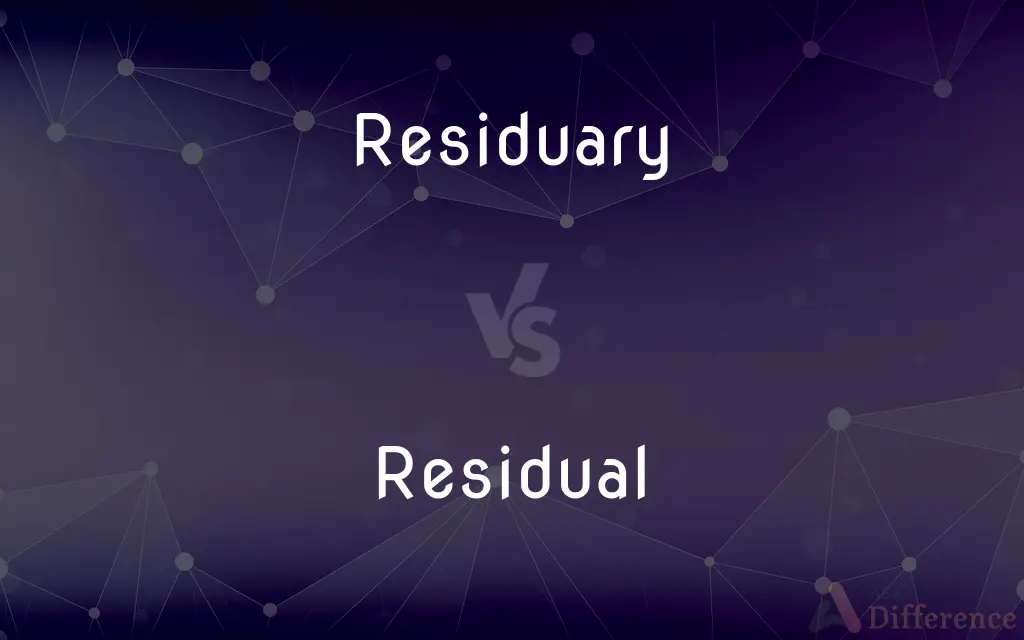Residuary vs. Residual — What's the Difference?
Edited by Tayyaba Rehman — By Urooj Arif — Updated on April 8, 2024
Residuary refers to what remains of an estate after debts, legacies, and bequests are settled, while residual focuses on what is left after a process, not specific to legal contexts.

Difference Between Residuary and Residual
Table of Contents
ADVERTISEMENT
Key Differences
Residuary is primarily used in legal contexts, referring to the remainder of an estate after all debts, legacies, and bequests are distributed according to a will or law. On the other hand, residual applies more broadly to any remainder left after the main part of something is gone or used up, not limited to legal scenarios.
Residuary beneficiaries are those who receive the remainder of an estate, which is determined after specific bequests and obligations are fulfilled. Whereas, residual values often relate to financial or scientific calculations, such as the residual value of an asset after depreciation or the residual effects of a treatment in a study.
In terms of financial implications, residuary can significantly impact how an estate is divided among beneficiaries, ensuring that certain individuals receive the remainder of an estate. Residual, meanwhile, might refer to the remaining value of an asset, influencing financial decisions and accounting practices.
The concept of residuary is integral to estate planning, focusing on the distribution of what remains after explicit allocations. In contrast, residual can play a critical role in various fields, including science, finance, and engineering, where it denotes leftovers from processes or calculations.
While residuary involves a legal and formal process governed by the conditions of a will or statute, residual is more flexible and can refer to leftovers in any context, from material remains after a chemical reaction to data points that do not fit a predictive model.
ADVERTISEMENT
Comparison Chart
Definition
Pertains to the remainder of an estate after specific allocations
Refers to what remains after the main parts have been used or removed
Context
Primarily legal
Broad, including finance, science, and everyday language
Implication
Affects distribution of estate assets
Influences financial decisions, scientific calculations, etc.
Beneficiaries/Users
Heirs in the context of estate planning
General term applicable in various fields
Legal Relevance
High, integral to wills and estate distribution
Low, not typically used in legal documents
Compare with Definitions
Residuary
Integral to estate planning and will drafting.
The attorney advised on how to allocate the residuary portion.
Residual
Applies in scientific research to describe remaining quantities.
The study focused on measuring the residual radiation levels.
Residuary
Pertaining to the remainder of an estate after bequests and debts.
The residuary beneficiary received the estate's remaining assets.
Residual
Often used in financial contexts to describe remaining value.
The residual value of the car was considered in the lease agreement.
Residuary
Refers to the remaining portion after specific disbursements.
The residuary estate was larger than expected, due to wise investments.
Residual
Referring to what remains after most of a thing is removed or used.
The residual smell of paint lingered in the room.
Residuary
Used in legal contexts to describe the residual part of an estate.
His will specified a charity as the residuary legatee.
Residual
Pertains to leftover effects or substances.
Residual symptoms may persist after the treatment.
Residuary
Determines the final beneficiaries in estate distribution.
She was surprised to learn she was the residuary heir.
Residual
Can denote remaining data points in statistical models.
The residuals were analyzed to improve the model's accuracy.
Residuary
The remainder of something after removal of parts or a part.
Residual
Of, relating to, or characteristic of a residue.
Residuary
Matter remaining after completion of an abstractive chemical or physical process, such as evaporation, combustion, distillation, or filtration; residuum.
Residual
Remaining as a residue.
Residuary
The part of a monomer or other chemical unit that has been incorporated into a polymer or large molecule.
Residual
The quantity left over at the end of a process; a remainder.
Residuary
(Law) The remainder of a testator's estate after all specific bequests and applicable debts and expenses have been disposed of. Also called residuum.
Residual
Often residuals A payment made to a performer, writer, or director for each repeat showing of a recorded television show or commercial.
Residuary
Of or relating to a residue; residual; left over, when the main portion has been removed.
Residual
Of, relating to, or remaining as a residue; left over.
Residuary
(legal) With respect to a will, relating to the portion of an estate which was not disposed of in the will, or for which the directions in the will could not be carried out.
Residual
A remainder left over at the end of some process.
Residuary
One who receives the residue of an estate.
Residual
(in the plural) Payments made to performers, writers and directors when a recorded broadcast is repeated.
Residuary
Consisting of residue; as, residuary matter; pertaining to the residue, or part remaining; as, the residuary advantage of an estate.
Residual
(statistics) the difference between the observed value and the estimated value of the quantity of interest
Residuary
Entitled to the residue of an estate (after payment of debts and specific gifts);
The residuary part of the estate
The residuary beneficiary
Residual
(paranormal) A spiritual presence left behind in a place as a result of a person's death or some other significant event.
Residuary
Relating to or indicating a remainder;
Residual quantity
Residual
Pertaining to a residue; remaining after a part is taken.
Residual
The difference of the results obtained by observation, and by computation from a formula.
Residual
Something left after other parts have been taken away;
There was no remainder
He threw away the rest
He took what he wanted and I got the balance
Residual
(often plural) a payment that is made to a performer or writer or director of a television show or commercial that is paid for every repeat showing;
He could retire on his residuals
Residual
Relating to or indicating a remainder;
Residual quantity
Common Curiosities
Can residual values be negative?
Yes, residual values can be negative, especially in statistical models where they represent the difference between observed and predicted values.
What is a residuary beneficiary?
A residuary beneficiary is an individual or entity designated to receive the remaining portion of an estate after all debts, bequests, and legacies are settled.
Is residuary the same as residual?
No, residuary specifically pertains to the legal context of estate distribution, while residual has a broader application across various fields.
How do you determine the residual value of an asset?
The residual value of an asset is determined based on factors like its expected lifespan, depreciation rate, and potential for future use or sale.
Is a residual beneficiary the same as a residuary beneficiary?
In practice, the terms are often used interchangeably, but "residuary beneficiary" is the more correct legal term for someone who inherits the remainder of an estate.
How is residuary estate calculated?
The residuary estate is calculated by subtracting the total value of debts, specific bequests, and administrative expenses from the total value of the deceased's estate.
How does depreciation affect residual value?
Depreciation reduces an asset's book value over time, affecting its residual value by accounting for wear and tear or obsolescence.
Can something have both residuary and residual aspects?
Yes, in contexts where both legal and practical remnants are considered, such as in estate management and asset valuation, both terms may apply.
What role does a residuary play in estate planning?
A residuary plays a central role in estate planning by designating the distribution of the estate's remaining assets after specific bequests are made.
Can residuals indicate problems in a statistical model?
Yes, large or systematically patterned residuals can indicate problems in a statistical model, suggesting it may not accurately fit the data.
What does residual mean in statistics?
In statistics, a residual is the difference between an observed value and the value predicted by a model, indicating the model's accuracy.
Are residuary clauses important in wills?
Yes, residuary clauses are crucial in wills, as they ensure the entire estate is distributed according to the testator's wishes, covering assets not specifically mentioned.
What factors affect residual effects in medical treatments?
Factors affecting residual effects in medical treatments include the drug's half-life, patient's metabolism, and overall health condition.
How do residuals relate to model diagnostics?
Residuals are used in model diagnostics to assess the fit of statistical models, identifying outliers and ensuring that the models accurately represent the data.
Can a residuary clause prevent estate disputes?
A well-drafted residuary clause can help prevent disputes by clearly specifying how the remainder of the estate should be distributed.
Share Your Discovery

Previous Comparison
Adapt vs. Adopted
Next Comparison
Anybody vs. AnyoneAuthor Spotlight
Written by
Urooj ArifUrooj is a skilled content writer at Ask Difference, known for her exceptional ability to simplify complex topics into engaging and informative content. With a passion for research and a flair for clear, concise writing, she consistently delivers articles that resonate with our diverse audience.
Edited by
Tayyaba RehmanTayyaba Rehman is a distinguished writer, currently serving as a primary contributor to askdifference.com. As a researcher in semantics and etymology, Tayyaba's passion for the complexity of languages and their distinctions has found a perfect home on the platform. Tayyaba delves into the intricacies of language, distinguishing between commonly confused words and phrases, thereby providing clarity for readers worldwide.
















































